In the late ‘90s, the ‘Yahoo Yodel’ was inescapable.
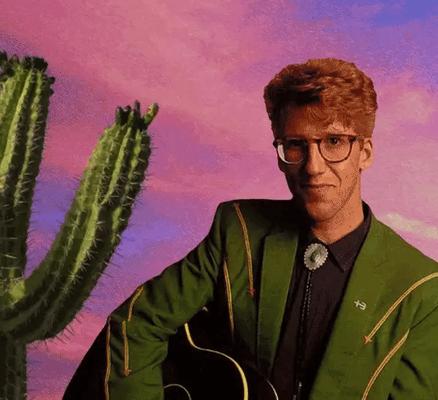
For a time, the 3-note audio clip — Ya-hooooooooo-oooo! —defined the young tech company: It came preloaded in Yahoo-branded bottle-openers, doorbells, and plush toys. It chimed through computer speakers. It made appearances in Super Bowl commercials, TV shows, and movies.
But the man who recorded this famous 3.5-second ballad was largely absent from the conversation. That is, until he sued Yahoo for copyright infringement.
This is the tale of an unlikely meeting between a one-time tech giant and a yodeler from the desolate western plains.
Born to yodel
Wylie Gustafson grew up in the “empty part of the country,” a stretch of ranchland in Northern Montana 50 miles from the Canadian border.
After long days tending to cattle, his father, Rib, would whip out his old Martin guitar and serenade the family with “cowboy songs” — undulating ditties that called for lyrical storytelling and an occasional yodel.
“My dad would yodel whenever he was happy,” says Gustafson, “whether it was up on a ski hill, or out in the country on horseback.”
Yodeling ran in Gustafson’s blood. His aunt, an Olympic-level skier, had spent some time in the Swiss Alps with Austrian athletes who’d given her a rare quarter-inch reel-to-reel instructional tape on the lost art form of yodeling.
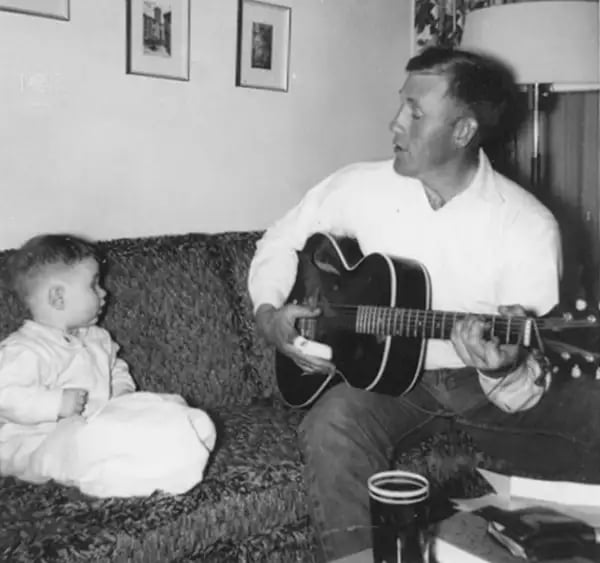
On long summer days in the early 1970s — the era of The Rolling Stones, Led Zeppelin, and Pink Floyd — Gustafson spent hours yodeling. In his room, he’d slow the tape down to half-speed and mimic the tongue tricks and aural illusions of the masters.
By 13, he’d locked down the basics, from the “slow, ethereal Northern Plains yodels” to the “fancy cowboy yodels derived from Northern Europe.”
He weaseled his way into his brother’s band (“they needed a cheap bass player”), toured the high school dance circuit, and honed his chops. Then, like any yodeling yeoman worth his weight, he ventured out on his own.
A cowboy in the City of Angels
In 1986, at the age of 25, Gustafson mosied to the congested pastures of Los Angeles to try his hand at music.
LA, he soon realized, was a land of shticks. He needed some kind of distinguishing factor to set his band, Wylie and the Wild West Show, apart from the masses.
“One night in a bar, I went up on stage and just cranked out a yodel — and everyone stopped, put down their drinks, and listened,” he says. “It was then that I realized the true power of the yodel.”
In short order, Gustafson became known around town as the “yodeling guy.”
Yodeling was once a big business. After famed country singer Jimmy Rodgers released “Blue Yodel No. 1” in 1928, America was gripped by a national yodeling craze that led to the rise of the singing cowboy trope in Western films. Recording artists in the ‘30s made big bucks yodelay-heeeee-hooooo’n.
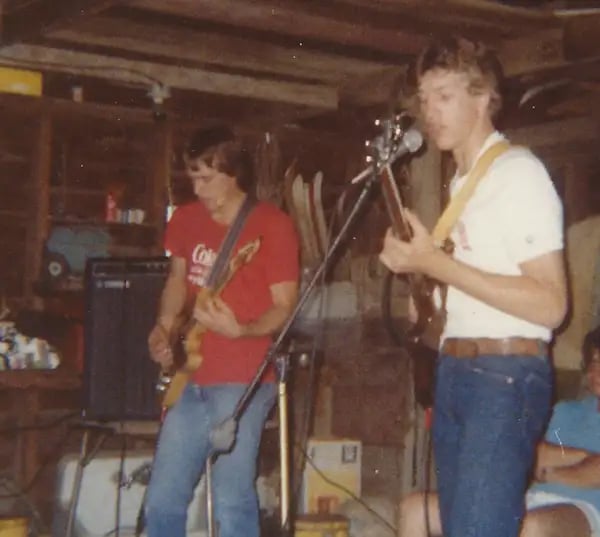
Those days were long gone, but Gustafson happened to strike a fortuitous chord.
In the early 1990s, commercial advertisements were going for quirkiness. “Believe it or not, the two hottest trends in advertising were surf music and yodeling,” says Gustafson. “I became the go-to-yodeler for those ads.”
Gustafson was courted by Elias & Associates, an audio production facility which, throughout the decade, got his yodels featured in more than a dozen ad campaigns with brands like Bud Light, Sprint, Mitsubishi, Porsche, and Taco Bell.
Then, a few years into his career as a commercial yodeler, he got a call that would change his life.
The yodel heard ‘round the world
By 1996, Gustafson had migrated to his wife’s pastoral farm in Washington, where he spent his days wrangling cattle and touring with his band. One day, the ad agency phoned him with an offer.
“They said they had this little internet startup by the name of ‘Yahoo’ that was looking for a yodel,” he recalls.
Founded two years earlier as “Jerry’s Guide to the World Wide Web,” Yahoo was one of the “pioneers of the early internet era.” At the time, they had just had their initial public offering (IPO): Their shares were up 270%, and they were basking in the success of the tech boom.
Gustafson was told the company wanted to run a regional TV ad and was asked to come up with a yodel — “something light, funny, and ear-catching.”
For national campaigns, Gustafson received union-scale pay, which meant lucrative residuals every time a commercial aired. But since the Yahoo spot was supposedly a regional commercial, he accepted a one-time payment of $590.38.
“I went down to a studio in LA, and in 10 minutes I knocked out probably 20 to 30 different 3-second yodels,” he says. “Then, I went home and forgot all about it.”
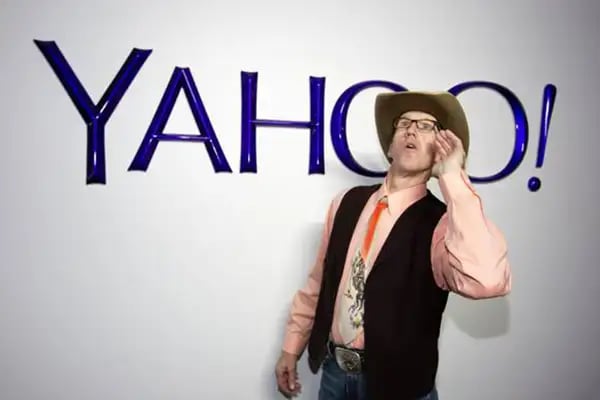
Two years later, on January 31, 1999, Gustafson was watching the Super Bowl when — lo and behold — he heard his yodel in a national Yahoo ad.
“I jumped up and said, ‘Wait a minute! That wasn’t the deal!” he recalls. “Nobody had told me that Yahoo was going to make my yodel the defining sound of the company.”
Since Gustafson had recorded his yodel, Yahoo had grown into a tech behemoth. The company’s market cap had grown from less than $1B to $115B, and its stock price had skyrocketed 600%.
The yodel, it turned out, had come along for the ride.
Unbeknownst to Gustafson, his distinctive 3-note howl had achieved international fame: It was everywhere — on their search page (when you clicked on the exclamation point in the logo), in email inboxes (when you received an email), in audio-equipped bottle openers, and even in Hollywood movies (Inspector Gadget).
Gustafson felt cheated. He’d been told, in clear terms, that what he’d recorded was for a one-time regional commercial. Now, it was the signature audio slogan of one of America’s fastest-growing tech companies.
Law-suuuuuuuu-uuuit
Shortly after the Super Bowl, Gustafson wrote a letter to Elias & Associates, the ad agency who’d set him up with the Yahoo gig.
They sent him a check for an additional $590.38 and considered the issue resolved.
But Gustafson didn’t go away: Everywhere he turned, he heard his yodel — and over a period of two years, he sent Yahoo multiple letters demanding some type of action. The company never responded.
So, the yodeler lawyered up.
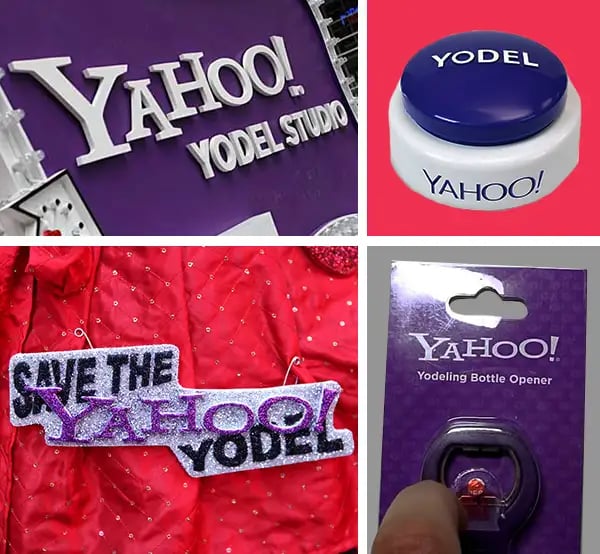
In 2002, with the help of LA-based attorney, Larry Russ, Gustafson filed a copyright on his yodel (Registration No. SRU 455-556, appropriately dubbed “Wylie’s Yahoo Yodel”), then filed a copyright claim against Yahoo. [The full complaint, shared for the first time with The Hustle, can be read in full here.]
Russ then staged a press release and got his yodeler’s ordeal coast-to-coast coverage in every outlet from the Los Angeles Times to the New York Times. In short order, Yahoo was swimming in a mountain of bad press.
“They deserved it,” Russ tells us. “They paid him a few hundred dollars for what became a hallmark of their company for years.”
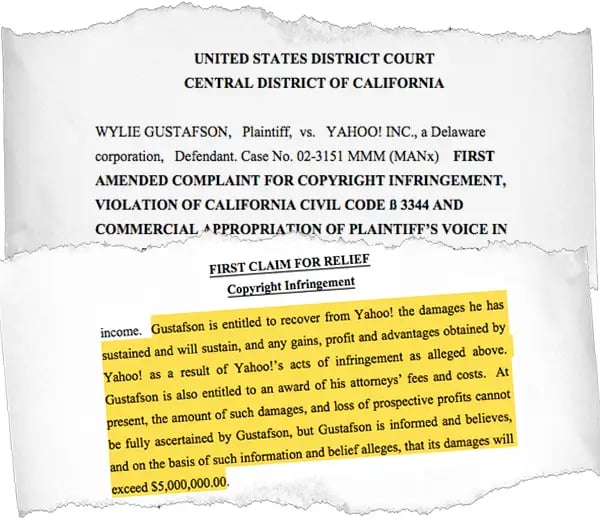
Within days, an assistant general counsel for Yahoo was on a plane to meet with Russ; the matter was settled over breakfast.
Neither Gustafson nor Russ could confirm the settlement amount (both parties signed a non-disclosure), but Gustafson says it was a “life-changing amount of money.”
“Originally, we had asked for $5 million,” says Gustafson. “The final amount wasn’t quite there, but it was a pretty good fraction of that.”
Gustafson, who’d been earning a living touring with his band 300+ days per year, was able to dramatically cut back his time on the road, build a new horse arena, and kick up his boots on his Montana ranch.
Riding off into the sunset
As part of the agreement, Yahoo was given exclusive and unlimited rights to the copyright — and they took full advantage of it.
In the mid-2000s, they put on a national yodeling tour, bouncing from city to city in search of America’s best yodelers. Gustafson served as the judge.

The cowboy stayed involved with Yahoo over the years, commuting to California for the occasional promotional event or office talk, but each time he returned, the company seemed to be in a deeper state of flux.
“I’d go there and get to know some of the employees,” he says. “Then, I’d go back a year later and everyone would be gone. Yahoo was going through a lot of people.” Eventually, the Yahoo Yodel died in the wind, an ephemeral yawp lost in the translation of executive shuffles.
In more than 30 years of performing — a career including shows at the famed Grand Ole Opry, appearances on A Prairie Home Companion, and a prestigious deal with Rounder Records — the Yahoo Yodel endures as Gustafson’s enduring claim to fame.
“As a songwriter, I always dreamed of getting that one 3-minute hit,” he says. “Turns out, mine was 3 notes.”
